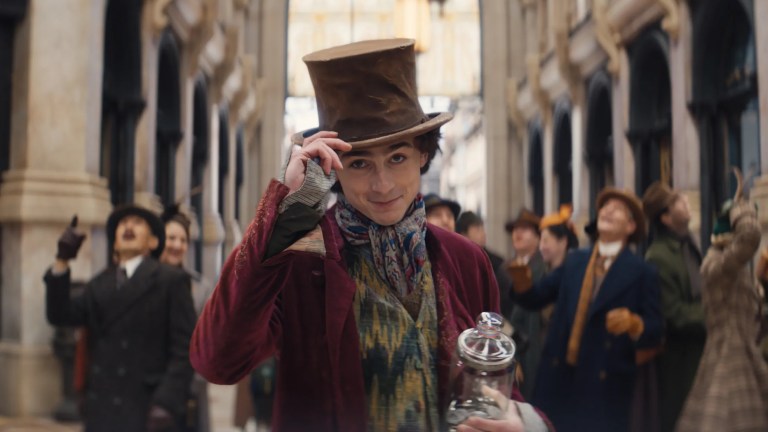Wonka Review: Timothée Chalamet Makes a Sweet Song and Dance Man
Paul King brings a little bit of his Paddington magic to Wonka, a surprisingly joyful musical wherein Timothée Chalamet trips the light fantastic.

Director Paul King does not qualify his newest movie as a traditional film production. Nor does he credit it as a Paul King “picture,” “joint,” or otherwise effort of industry. Instead, during the opening titles of Wonka, the movie is simply described as “a Paul King confection.” It’s a cute flourish for a movie about the most famous chocolate maker in cinema. It also proves surprisingly, and joyously, apt; for Wonka is indeed the sweetest thing you are likely to experience at a movie theater this holiday season. More impressive still, it doesn’t feel like teeth or brain rot either.
To be sure, in its best moments, Wonka is a pure sugar rush. It leaps and bounds alongside its characters as they dance across the surfaces of a nighttime sea; it also ascends as they do by way of a handful of balloons, floating ever upward toward a star-encrusted sky as if they were Kelly and Caron (or at least Gosling and Stone). That’s because despite the marketing team’s most bashful attempts at genre omission, Wonka is an homage to Ghirardelli’s musical, and a surprisingly old-fashioned one at that, seeking to beguile like so many of the Golden Age Hollywood fantasias. It can even win over Yuletide skeptics.
This reviewer was one such doubter. After all, the classic Gene Wilder movie, Willy Wonka and the Chocolate Factory (1971), was in no more need of a prequel than it was a remake—a fate it similarly endured to ghastly results in 2005. Additionally, after watching Wonka, I still am unconvinced that Timothée Chalamet’s Willy is a true precursor to Wilder madnesses yet to come. But the secret ingredient in King’s recipe is it really isn’t trying to be that. Sure, there are echoes to Wilder’s Willy Wonka, such as Chalamet wearing a plum coat and even singing a few bars of the same songs with little orange men in green hair. However, Wonka in truth has more in common with Broadway musicals like Annie and The Music Man than it does the classic ‘71 film. This is a wall-to-wall toe-tapper about a man with a hat and a dream coming to town.
We in fact meet this man fully formed and largely devoid of the typical backstory tedium that prequels get lost in. When Wonka starts, Chalamet’s Willy is an aspiring chocolatier who has already mastered his art to the point of magic and is now arriving in a fictional European city to compete with the toniest and most respected chocolate makers of the world. If they would only let him.
With an immediately ingratiating “I Want” song about his hopes (and quickly dwindling funds), Willy doesn’t make it out of the first 10 minutes with a cent to his name. Little does he realize though that he was set up to fail because this ancient city’s greatest chocolatiers, the respected Mr. Prodnose (Matt Lucas), Mr. Fickelgruber (Matthew Baynton), and of course Mr. Slugworth (Paterson Joseph), have entered into a secret “chocolate cartel” and will not let anyone else succeed—even if it means pretending to not be impressed when Willy’s chocolate makes customers fly.
Ostracized by his desired peers, and hounded by their corrupt lapdog police chief (Keegan-Michael Key as a copper bribed with candy), Willy struggles to make ends meet. This becomes a fatal problem when he meets Mrs. Scrubbit (Olivia Colman), a landlady who uses her boarding house contracts to ensnare visitors into indentured servitude. Enslaved alongside an eclectic brood of side characters, the most important of which is a little girl named Noodle (Calah Lane), Willy is left with only one path forward: To make chocolate, of course, and to use that delectable goodness to buy his freedom.
There is a lot of plot in Wonka, much of it reverse engineered by screenwriters King and Simon Farnaby to seemingly justify telling a prequel to Roald Dahl’s rather perfect children’s story. To focus on that, however, is to get lost in Wonka’s weakest and, thankfully, most glossed over flavors. Other sour bites include a rather bizarre subplot about Willy Wonka not being able to read as an adult that smells of a rotten studio note. A rather by-the-numbers climax inside the chocolate cartel’s secret lair likewise seems the kind of commercial concession that would make middle-aged Willy wince.
Yet that is not where King’s heart lies, nor is it the aftertaste the film leaves you with on the ride home. Remaining very much the filmmaker who created the virtually perfect Paddington 2, which Farnaby was also a co-writer on, King brings the same kind of warmth and wry British sense of humor to Wonka. Like that movie about the misadventures of a well-meaning teddy bear, Wonka reimagines Dahl and Wilder’s aloof sorcerer of sweets as a singing and dancing Henry Hill, minus the guile. Chalamet’s Wily comes to town to sell chocolate and just so happens to make the lives of every kind person he meets demonstrably better along the way.
It is not particularly deep, but like an oversized Christmas sweater, it’s a cozy fit that’s aided immeasurably by Chalamet’s most theatrical screen performance to date. While neither the greatest singer or hoofer, Chalamet turns out to be an all-around terrific showman, reimagining Wonka as a kooky master of ceremonies whose happiness is infectious, even when no one can quite put a finger on what this guy is about. He is a pied piper of sorts, leading a stacked cast of British and American character actors to the tastiest promised land. Among them is the always sublime Colman getting to do her own riff on Mrs. Lovett from Sweeney Todd. Meanwhile Key’s easily corruptible lawman inexplicably has a Brooklyn accent thicker than his character’s expanding waistline. It makes no sense for a story set somewhere vaguely in early 20th century Germany (or thereabouts), and it doesn’t matter a wit. It’s a charm offensive you feel compelled to indulge, especially after seeing those sets designed by Nathan Crowley.
Of course the player folks will be most intrigued by is Hugh Grant as an Oompa Loompa. It’s shameless stunt casting: superfluous and not technically needed. But the same could be said about chocolate in general unless the flavors really blend into something special—and Grant’s dryness continues to pair sharply with King after the pair’s work on Paddington 2. Who knew Oompa Loompas could be such drolly chic little fellows?
Even after it’s over, there are reasons to still doubt whether we needed a Willy Wonka origin story, or for that matter whether this one aligns with what Dahl and Wilder intended. And yet, a bit like King’s most popular protagonists, the filmmaker has revealed a knack for taking the most dubious of scenarios, including a studio shamelessly raiding its IP library, and sprinkling atop it a little magic, plus a dash of pure imagination.
Wonka opens in theaters on Friday, Dec. 15.

